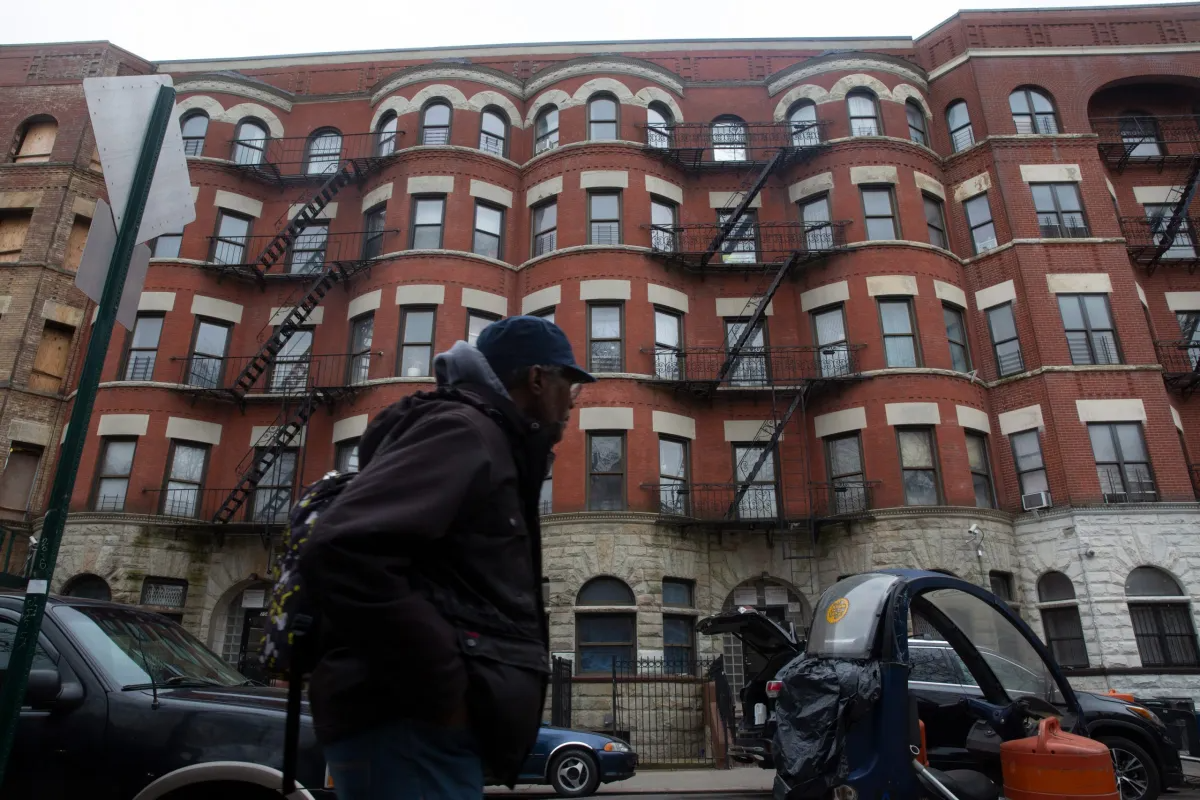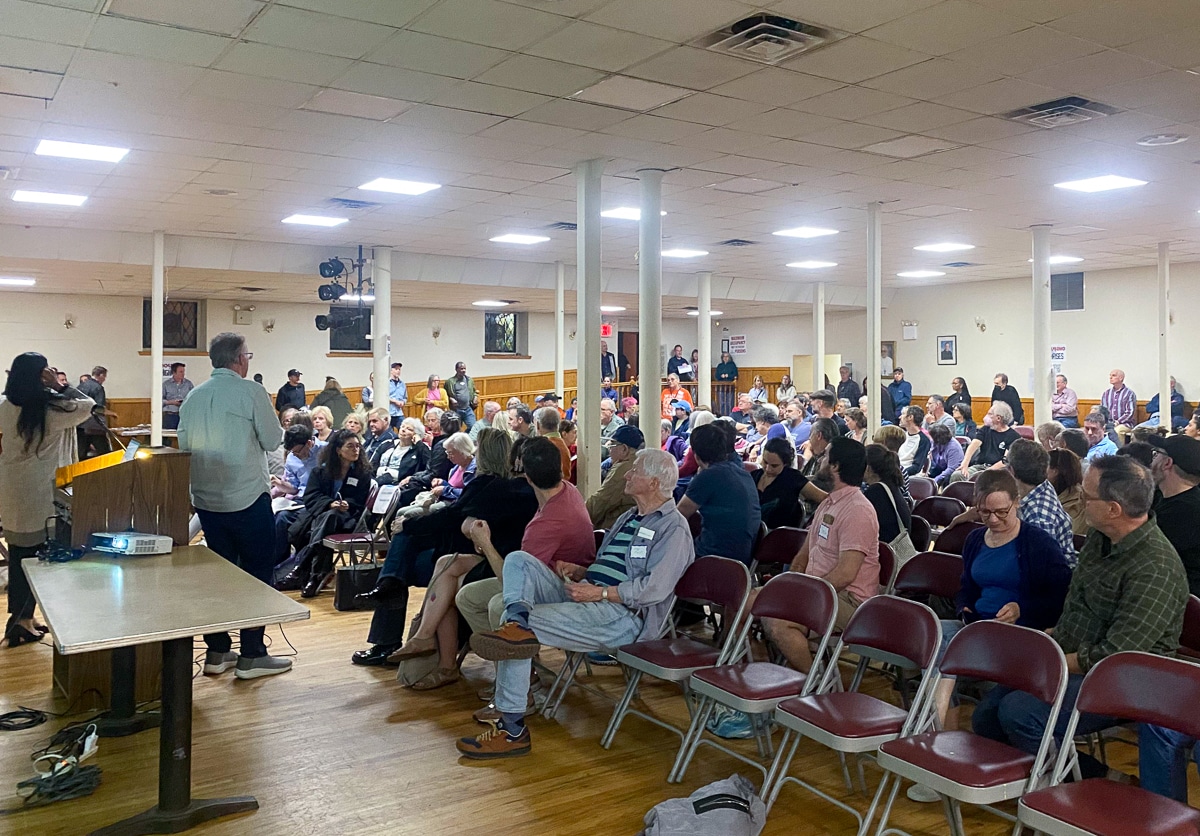Minorities Disproportionately Hit by Foreclosure Crisis
As the foreclosure crisis sweeps the area, blacks and Latinos have been particularly hard hit, according to an article in the NY Times. In fact, in 85 percent of the hardest-hit neighborhoods, the majority of homeowners are black or Latino. The most jarring statistic in the article was that middle class black households were five…

As the foreclosure crisis sweeps the area, blacks and Latinos have been particularly hard hit, according to an article in the NY Times. In fact, in 85 percent of the hardest-hit neighborhoods, the majority of homeowners are black or Latino. The most jarring statistic in the article was that middle class black households were five times as likely to have a subprime mortgage than whites earning similar annual incomes of $68,000 and higher. When The Times visited a stretch of Bainbridge Street in Bed Stuy (photo), it found anecdotally that a number of middle-class black professionals were paying interest rates of nine to 11 percent on their mortgages. One explanation given is a historic mistreatment by, and ensuing mistrust of, mainstream banks by the black community; another, of course, is the targeting of black customers by the most predatorial providers of sub-prime financing. I don’t want to say it’s in the cultural DNA, but a lot of us who are older than 30 have some memory of disappointment or humiliation related to banks, said Colvin Grannum, president of the Bedford-Stuyvesant Restoration Corporation. The white guy in the suit with the same income gets a loan and you don’t? So you turn to local brokers, even if they don’t offer the best rates. Another counter-intuitive fact: Middle-class blacks were more likely than lower-income blacks to have subprime mortgages. The hypothesized reason? The lower-income earners had access to, and took advantage of, community resources (free classes, etc.) to educate themselves. Still, the efforts to make the dream of home ownership more readily available to minorities that began under President Clinton in the 1990s has certainly had some dire unintended consequences. Rather than helping to narrow the wealth and home ownership gap between black and white, Mr. Grannum said, we’ve managed in the last few years to strip a lot of equity out of black neighborhoods.
Minorities Affected Most as New York Foreclosures Rise [NY Times]
Photo by kenf225









“I still say there should be a law mandating a 3 hour class for anyone getting a first time mortgage or refi. No certificate of completion of class, no mortgage.”
Good idea. Though maybe make it one hour? Ha.
I would also be remiss in not pointing out the excellent work some of our local politicians do in regard to educating the community on predatory lending. Specifically Karim Camara, Jesse Hamilton and Tish James’ offices. They have been very helpful in co-sponsoring workshops, and running programs of their own. We’re on it, but let’s face it, we can’t catch everyone before they make the mistake of a lifetime. However, the more people know, the fewer do make that mistake.
I still say there should be a law mandating a 3 hour class for anyone getting a first time mortgage or refi. No certificate of completion of class, no mortgage.
Everyone is “subprime” in the Mutant Asset Bubble!
The funny thing is no one would listen to reason. The Retards (All Races) thought they was the next Donald Trump! Now I got burned because I’m “insert excuse here”.
Say goodbye to insanity, Dumbasses….
The What
Someday this war is goona end…
It’s very easy to fall into the trap of blaming the victim- as MM says, Mr. Grannum is expressing his opinion- but it takes some serious condescension to talk about Black people’s “lingering paranoia” as the reason for a higher rate of foreclosures in minority areas and to reference the Tuskegee study as a classic example. To dispute the very real effects of racism- which do exist, yes-even today says loads about your own very white perspective. Your comment “This actually appears to be a case history of how lingering *paranoia* about racism has damaged black well-being more badly than racism itself. ” is offensive and racist in its own right. And ignorant- for as MM points out, these communities do a great deal to help themselves- and not much attention is paid to them by the press.
I also would like to point out that while it could be said in NYC minorities dominate in poorer neighborhoods, that isn’t necessarily the case in all poor neighborhoods across the country and where foreclosures are impacting just as hugely. My point being that sub-prime lenders target the poor or those with less than stellar credit. White or black- these people fell for sophisticated and predatory marketing. It’s not “lingering *paranoia*, its victimization.
“But there are a lot of grassroots community organizations, including mine, the Crown Heights North Assoc., that are holding seminars, sending out flyers, and doing our best to educate the community on the topic of minority held mortgages in general, predatory lending, specifically. We have been working with the DA’s office, Neighborhood Housing, PACC, and other non-profits, all of us trying the best we can to help people hold onto their homes, and avoid falling prey to these vultures.”
Well, that is awesome.
Brenda, I’m on board with getting some of our community loudmouths to speak out on predatory lending with the same vigor and vitriol they exude for lesser topics, like complaining about who the streets are named after. But there are a lot of grassroots community organizations, including mine, the Crown Heights North Assoc., that are holding seminars, sending out flyers, and doing our best to educate the community on the topic of minority held mortgages in general, predatory lending, specifically. We have been working with the DA’s office, Neighborhood Housing, PACC, and other non-profits, all of us trying the best we can to help people hold onto their homes, and avoid falling prey to these vultures. It’s a constant battle, as they come up with new and creative ways to screw people every day. Now it’s “we can help you fix your loan problems”. Yeah, the ones they created. Disgusting.
Also, as I would never presume to speak for the entire black or minority community, none of the people interviewed do either, nor did they say they did. Mr. Grannum’s opinion is just that, and I really don’t think he meant to imply that the “white guy in the suit” is the cause for all of the injustices, problems or blame in this matter, or every other. However, if all else is equal, except for the color of one’s skin, or the neighborhood one is buying in, then questioning the reason behind the huge discrepancy in interest rates is perfectly legit. Racism is an old dinosaur lumbering towards the tar pits, but it’s still got some teeth, and will still bite if you get in its path.
Brenda, I don’t know, but I think it’s the idea that you kick some business to a brother even if the rate is not the best.
Having read the Times article since making my comments, I will stand by them. Although minorities were unquestionably targeted by predatory lenders, these lenders apparently played into a historic mistrust of conventional mainstream banks…and minority advocates even now would do better to focus on creating a class of fiercely demanding and well-educated minority consumers (who know their rights in the financial arena and insist on them) than on stoking resentment over past injustices, however real. BTW: The next wave, according to the article, is the carcass-picking vultures circling over these communities offering to “fix” mortgages for $4K or more and then ripping these vulnerable homeowners off all over again. Why aren’t our gov’t consumer protection agencies and community organizers rolling out a massive educational effort (similar to efforts on AIDS testing and prevention) to warn people at risk from this second scourge? The city could literally mail a multi-lingual warning to every address in the worst-affected zip codes, along with repeated info re: trustworthy resources for real help. And the Sharptons and Charles Barrons of this world could redirect their energies to the effort…but, now I’m just dreaming!
[To quote the article:
Colvin Grannum grew up in a black neighborhood in Brooklyn and became president of the Bedford-Stuyvesant Restoration Corporation, a nonprofit organization that builds and renovates housing. His father bought several properties in the 1950s and ’60s, often without turning to banks.
“I don’t want to say it’s in the cultural DNA, but a lot of us who are older than 30 have some memory of disappointment or humiliation related to banks,†Mr. Grannum said. “The white guy in the suit with the same income gets a loan and you don’t?â€
“So you turn to local brokers, even if they don’t offer the best rates.â€
Oh yeah, we’re still looking for a place. Very few two families available where we live. Most of what is there is in very poor condition.